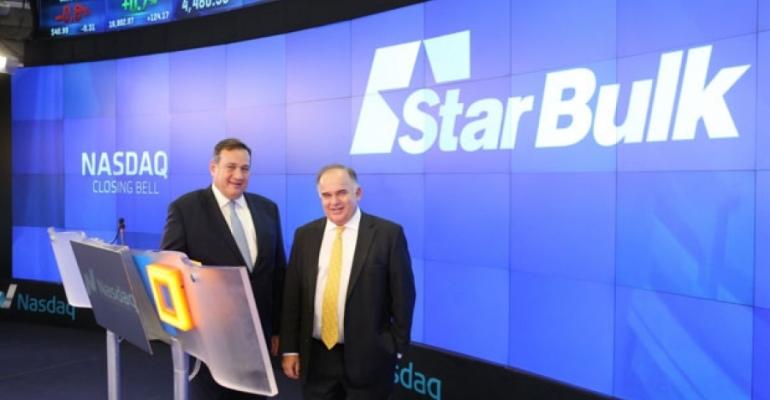With the global 0.5% low sulphur cap deadline less than 19 months away the case for scrubbers, especially on larger vessels, has gathered rapid momemtum. Greek-run, US-listed Star Bulk is taking the plunge with scrubbers on 24 vessels, with one already fitted.
“Basically what we've done - we're proud to say that we've installed one scrubber already. And then we are installing our second scrubber as we speak. We have also ordered 22 scrubbers for mainly investing for our bigger vessels and we will see what we do thereafter,” Star Bulk ceo Petros Pappas, said in analyst call for its Q1 results, according to a transcript from Seeking Alpha.
On the company's experience with its first scrubber Pappas said: “We installed it a couple of months ago, and we've been operating it continuously and under as harsh conditions as we can because we want to test the various - the potential problems that it might offer and upto now, we have operated very smoothly and we're very happy with it.”
Pappas did not reveal the cost of retrofitting scrubbers to 24 vessels but did say the company had secured financing for them.
While some owners continue to lobby the International Maritime Organization (IMO) over the burden environmental regulations are placing on the industry, as was evident from the Union of Greek Shipowners (UGS) at Posidonia last week, Pappas takes that view that rather than trying to fight the system owners should adapt to it be it through fitting scrubbers or deciding to use distillate fuels.
Read more: Shipowners complain at the burden of environmental regulations, but trade will not grind to a halt
While pay back for scrubbers on large vessels is estimated at just 8 – 12 months for large vessels based on the expected spread in fuel prices between heavy fuel oil (HFO) and low sulphur fuel and distillates, this will only apply prior to 2020 if owners trade vessels in Emission Control Areas (ECAs).
“I mean there is basically no benefit financially whatsoever at this point. In principal, we can benefit from burning heavy fuel oil and emissions control areas but that is -- and the truth is the shifts that we're putting scrubbers on, the first two trade and emissions control areas very rarely. So it's really just a technical exercise, it's not a financial exercise,” he said.
For a 14,000 teu containership based on a price difference of $200 per tonne between HFO and low sulphur fuel, using low sulphur fuel would cost an additional $40,000 per day.
Read more: Scrubbers shown a little bit of love for large sized vessels
Star Bulk is not worried over people cheating the system with an expected ban on the carriage of heavy fuel oil if vessels do not have scrubbers fitted. “Now whether some people in obscure places will continue to use fuel oil, maybe so but this is going to be a very low percentage of the whole fleet in my view,” Pappas said.
Industry executives indicate that the moves by large owners such as Star Bulk and Angelicoussis to fit scrubbers have prompted many other owners to look seriously at installing exhaust gas cleaning systems.
Read More: Songa Shipmanagement opts for scrubbers from CROE for 14 vessels
Copyright © 2024. All rights reserved. Seatrade, a trading name of Informa Markets (UK) Limited. Add Seatrade Maritime News to your Google News feed.


